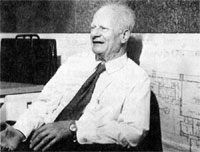Energy Independence a Matter of Survival, Bethe Says

Hans Bethe visits Fermilab
Hans Bethe, awarded the Nobel Prize in 1967 for his research on the energy production of the stars, spoke to a Fermilab audience on Wednesday, April 16, 1975. His topic -- updating a visit to Fermilab a year ago -- was "Energy Revisited."
A professor at Cornell University, in 1972 Dr. Bethe chaired an academic study of U.S. energy needs for the former U.S. Atomic Energy Commission. He is frequently called on to assess U.S. energy status and demands. Dr. Robert Wilson, introducing Bethe, remarked, "It seems appropriate that the Nation turned to the man who figured out how the stars produce energy."
Dr. Bethe pointed out that the current economic recession changes the energy crisis because surpluses of gasoline, for example, have accumulated during periods of decreased consumption and of conscious consumer efforts to reduce the use of energy. When the recession is over, he said, the problem will return with the same urgency exhibited in 1974.
"The goal of energy independence in the U.S. is not luxurious or a matter of prestige, but survival," he said. "We have some reserves, but many other countries have none, and if we compete for their supplies it will only make the situation worse." Immediate conservation steps and studying other ways to save energy are imperative. But a decrease in energy consumption means a decrease in the gross national product, he said. "People are indulging in delusions if they think it won't disturb the economy."
Proper concern should be expressed about the large shift of money to Middle Eastern sources following the settlement of last year's crisis. Use of energy for an increase in food production is a must, he feels.
Bethe approves of the "good old fashioned economics" which proposes to keep oil prices high to discourage use and to encourage exploration and expansion of new sources, such as the development of oil shale. "This should have high priority," he said. Another good investment would be pumping oil out of old oil wells.
Dr. Bethe praised the Rasmussen report on nuclear reactor safety which concluded that reactor accidents might occur in 1 of 2,500 reactor use years. It is a competent study, he thinks, and has already increased safety by a factor of 2 by suggestions made by the Rasmussen group to the industry in the course of the survey. Reactor safety will continue to improve, Dr. Bethe predicted, if 1,000 reactors come into operation with improved technology. Serious consideration might be given to putting reactors underground, he observed.
Waste disposal is far less of a problem than reactor accidents, according to Hans Bethe. At the moment there are many solutions being proposed. He described one process in which liquid nuclear wastes would be solidified into grains, then imbedded in large glass rectangles which could be buried underground where radiation would be eventually absorbed.
Nuclear power involves risks, but the problems of nuclear power must not be considered in isolation. "We need power," he said. "It is the poor people who suffer most from the decline in the economy that a shortage of power would produce, and this leads to social upheavals."


